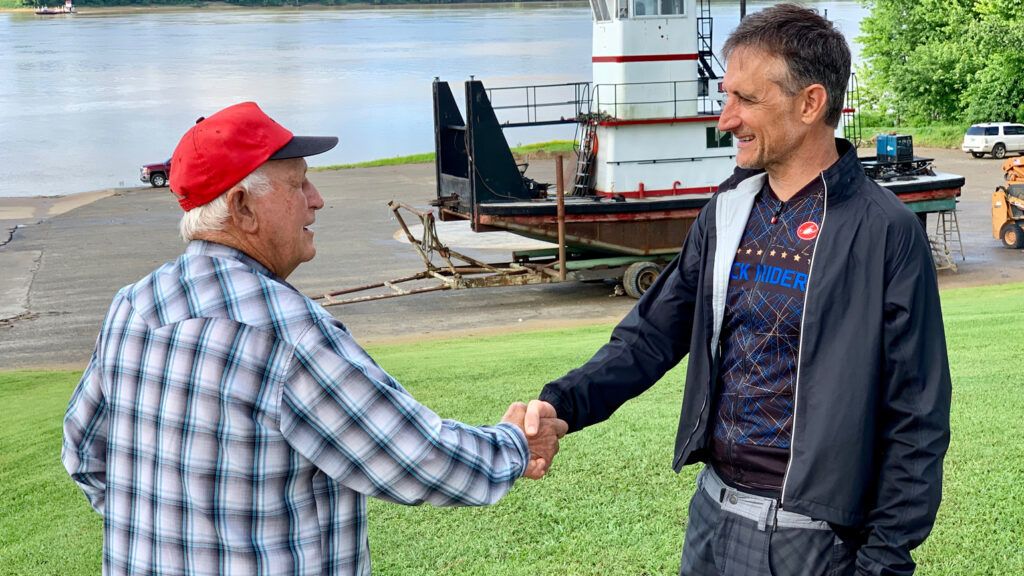Few conversations are more daunting than sharing your faith with strangers.
People happily strike up conversations about their kids, their jobs, their vacations. But change the topic to religion? and Things get awkward fast.
Why is it so hard to talk about faith? Is there a way to approach this vital, intimate subject with honesty and integrity at a time when religion, like so much else, has become a cause of division in our nation?
Yes, says Neil Tomba, senior pastor of Northwest Bible Church in Dallas, Texas.
Tomba (above, right) should know. In 2019, he rode a bicycle across the United States from California to Maryland for the express purpose of talking about faith to as many strangers as possible about faith. An avid cyclist, Tomba had long dreamed of such a ride. He decided to make it happen after a survey at his church revealed that most members seldom talked to strangers about their faith. This year, Tomba published a book about the ride called The Listening Road: One Man’s Ride Across America to Start Conversations about God; the book outlines his life-changing experiences on the 33-day trip.
Whether in a city or on a farm, the first thing Tomba said to people he encountered on the road was: “I’m doing a cross-country bike tour and listening to people about what matters most.” Then he asked questions and listened for moments of common ground.
“I wanted to model something,” Tomba said.“I didn’t use the word evangelism,” Tomba said. “I’m not against it but people have so many stereotypes about what that is. My goal is to end a conversation [about faith with a stranger] knowing I could have a second conversation with that person.”
Tomba said that in an ideal world, people from all religious backgrounds would feel free to share their beliefs and hopes without fear of offending or being rejected. Christians feel particularly conflicted about this issue, he said, because Jesus commanded his followers to spread the good news—regardless of whether people want to hear it.
So, how do you share your faith in a polarized world?
Tomba’s counterintuitive answer: Stop talking.
“I never felt the need to make sure someone hears a three-point message they can agree with. I don’t think I have to seal the deal…It’s not about being right or having the answer but coming alongside someone.”
Humility and open-mindedness created opportunities to connect, Tomba said. “I would say to people, ‘We are here to be kind, curious and respectful.’ People would say, ‘I don’t have time.’ And then once they started talking, they would say, ‘Do you have time for one more story?’”
Stories inevitably led to deeper layers where religious questions no longer seemed out of place.
Chatting with a woman at a convenience store, Tomba said he noticed an edge in her voice when she mentioned that her grandfather was a preacher. Tomba asked how she felt about religious issues herself.
“You want the honest truth?” the woman said. “I’m angry at God. My son worked the late-night shift. He was coming home and a semi hit him and he died.”
Tomba realized that whatever the woman knew about religion, it wasn’t enough to help her with her grief. “I cried with her and prayed with her,” he said. Then he shared the story of Jesus at Lazarus’ tomb.
“There’s a part of that story that says Jesus wept and he was angry,” Tomba told the woman. “I stopped right there. Her eyes got really big and she said, ‘I never thought about that before.’ It was almost like she saw Jesus in a new way. Not plastic Jesus. You could see there was this comfort moment knowing Jesus cared about people dying.”
Talking to pair of grizzled motorcycle riders a few days after Memorial Day, Tomba learned that one of them had lost his father in a military plane crash. The rider suddenly said, “I want you to pray for my struggles in faith and for our safety today. Thanks for talking to me. This was a divine appointment.”
“Sometimes it’s enough just to point to God,” Tomba said. “You become fluent about the hope in your heart.”
Tomba’s emphasis on listening and looking for points of common ground is echoed by noted evangelist Dave Gibson, senior director of missions and evangelism at Grace Church in Minneapolis and director of the Go Movement, a worldwide evangelism initiative.
Gibson said Jesus himself models such an approach. “Jesus saw the multitudes and was moved to compassion. We need to enter into someone’s life,” Gibson said. “Be a good listener. People want to be listened to and want to know someone cares about them. The book of James says, ‘Be slow to speak, quick to listen.’ Talk in terms of other people’s interest. Build a bridge from your heart to another life.”
Gibson said he once talked to a man on an airplane who devoted much of the conversation to denouncing religious people as hypocrites who cause of most of the world’s problems.
Gibson’s response: “Jeff, I can’t totally disagree with you. You and Jesus have a lot in common.”
Gibson told the man that he too had grown up disillusioned with organized religion. “I said, ‘Jesus’ sharpest rebuke was to the Pharisees. He didn’t win a popularity contest with religious leaders. He came with love and compassion and healed people, fed the poor, cast out demons and died on the cross.”
Gibson said the man “looked at me and said, ‘Dave, I like you. Normally, if a person talks to me about religion, I punch them in the mouth. I guess I don’t have as much of a problem with Jesus as with organized religion.”
“That’s a great place to start,” Gibson said.
“We have to get over the idea that we have to totally agree with each other or we hate each other,” Gibson said, summing up his approach. “I don’t find arguing is a good point at all. I try to be winsome. Try to point it back to Jesus and be respectful…Words are necessary but not the first thing. Words fall on deaf ears if there isn’t that life to back it up.”





